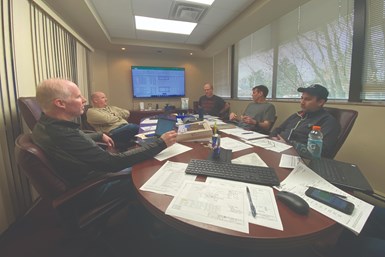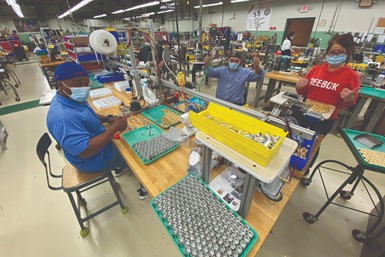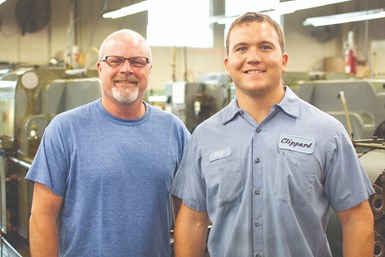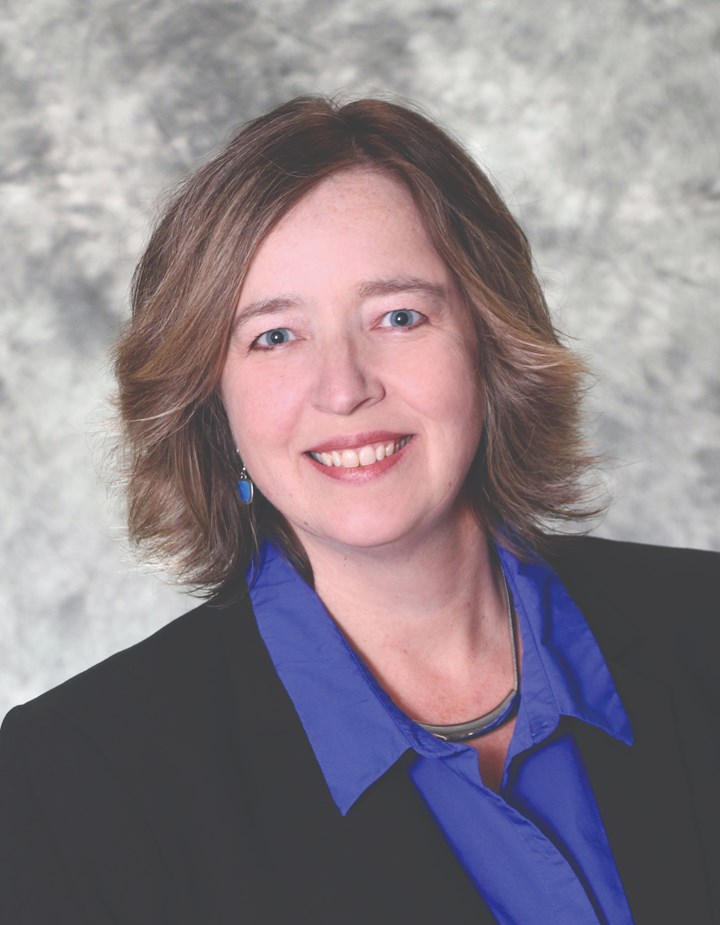Ventilator Crisis — Clippard Delivers for Ford
Clippard Instrument Laboratory Inc. in Cincinnati, Ohio, harnessed their talent, experience, capabilities and PMPA network to deliver 50,000 sets of ventilator parts to Ford Motor Company.

Bill Clippard and Robin Rutschilling (both on the left) meet with the team.
It’s a story about the people. When I first heard the story of Clippard supplying 50,000 sets of nine ventilator parts to Ford Motor Company, I thought it was going to be about the parts or the machines. I had the good fortune to hear the story from Robin Rutschilling, a director of operations for Clippard, and Ernie Doering, Clippard’s chief operating officer. After hearing them discuss how everyone came together to provide vital ventilator parts to Ford, it was obvious that it’s a story about talent, Clippard’s work culture, PMPA members and being better together.
Ford Places an Order
In March 2020, COVID-19 was the threat and the need for ventilators was high. GE Healthcare, in association with Ford, chose the Airon pNeutron model A ventilator — a design that Clippard had been providing parts to Airon since 1997. The biggest advantage of the Model A was that it is fully pneumatic and doesn’t require electricity. No electricity means no electronics which would have to be made overseas and, considering the supply chain disruptions COVID-19 caused, the pneumatic model was ideal. Which makes Clippard’s expertise in pneumatics the logical choice.
It all started with the email received on a Friday evening by Brady Webb, Clippard’s vice president of sales, from Ford on March 27, 2020, ordering 200,000 sets of nine ventilator parts (which later became 50,000 sets). Within an hour, Bill Clippard, president, met with Brady, Robin and Ernie to discuss logistics and call suppliers. According to Rutschilling, “On Saturday, we recruited a team of about eight or nine people to really think the project through and, by Monday morning, we hit the ground running.”
People Power

Clippard’s HR Department managed to hire 51 temporary employees in a week.
For a job that big, Clippard needed to hire temporary workers and, for the first time, Clippard was going to need a second shift. In one week, the HR department reached out to the community; handled interviews, background checks, orientations and scheduling; and hired 51 people for the Ford project. Of those hires, 48 went into assembly. Workers came from other industries which were affected by COVID-19 such as hospitality. College students and seniors in high school were also hired. These hires had a positive impact on Clippard’s workforce. “It was a five-month interview for some people and we were able to bring on at least 10 as permanent hires,” Doering says. “Assembly help had an immediate long-term impact and I think we’ve influenced some for future engineering skills to come in.”
PMPA Network — Better Together

Some of Clippard’s assembly workers for the Ford project.
With the volume of parts needed, Clippard needed help, so Rutschilling called Miles Free III, PMPA’s director of industry affairs, to recommend some PMPA members. “Not only did we get quotes from the members Miles suggested, but we received referrals and information,” Rutschilling says, “The PMPA members weren’t all out for themselves, they just wanted to help.” If a PMPA member knew of another member who could help the project, that member shared the contact.
Some of the PMPA members who really stepped up for Clippard were American Micro Products Inc., in Batavia, Ohio; Component Bar Products LLC in O’Fallon, Missouri; Horn USA in Franklin, Tennessee; Nolte Precise Manufacturing Inc. in Cincinnati, Ohio; Precision Plus in Elkhorn, Wisconsin; and Teale Machine Company Inc., in Rochester, New York. There were many other PMPA members who sent quotes or contributed valuable information, including Cox Manufacturing Company in San Antonio, Texas; PAWS Workholding Company in Clio, Michigan; and Sorenson Engineering in Yucaipa, California.
The PMPA collaborations included a needle valve which is critical to ventilator operation. The original specification for the needle valve wasn’t working properly, so Clippard’s engineering staff was able to meet with Ford and, within three days, had designed a new one.
According to Ernie, there were two pivotal moments regarding the needle valve. The first was the recognition that they could do it, which came through Robin’s relationship with another PMPA member, Mike Reader, at Precision Plus. Precision Plus machined the original part and could be a supplier to Clippard which gave Clippard the confidence to discuss the needle valve with Ford. “Precision Plus wasn’t a supplier of ours, but Mike and his staff were just phenomenal,” Rutschilling says. “They are fun to hang out with at PMPA conferences, but when it came down to needing help, they were there through this entire project and became a new, valuable supplier for us.”
The second pivotal moment was Ford’s realization of Clippard’s capabilities because of Clippard’s support which would prove beneficial in the future. Ford had initially wanted to redesign, but, due to a lack of time, the ease of manufacturing the pneumatic ventilator and the proven history of the Model A, Ford proceeded with the Model A. During a visit to Ford, the Ford engineers were open to ideas to reduce labor and increase throughput. Rob Clippard, Clippard’s Chief Marketing Officer, worked with Clippard’s engineers and developed several new design concepts that would optimize manufacturability.
Training Pays Off

Supervisor Scott Fible and Machinist Clay Schalk.
Clippard proudly invests time, energy and money into the training of young, technical personnel. Clippard puts them through an apprenticeship program which results in a cache of talent. “I saw them do more in one weekend than I ever thought was possible,” Doering says, “they went from almost nothing to what looked like a complete production line. It was incredible to watch.” Some workers, such as Clay Schalk, worked late into the night to get a machine set up and a part running. Others came in at 4 a.m. to get a job done. “No one asked them to do that. It shows the pride our workers have in what they do,” Rutschilling reflected.
Rutschilling gives credit to PMPA for encouraging training and pointing Clippard in the right direction. “You have to train your own staff if you want to have a quality company. It’s great to have help from schools, but owners need to realize that they need their own training program.”
Reflection
Clippard’s assembly room has slowed down on the Ford project and the parts have been delivered. With a moment to reflect on the entire experience, Clippard realized that the character of the company, the courage to say “yes” to the job, the Clippard employees who worked together and the connections with PMPA and other members made the Ford project possible. Better Together.
About the Author
Carli Kistler-Miller
Carli Kistler-Miller, MBA, has over 20 years of experience with communications, event/meeting planning, marketing, writing and operations. Email cmiller@pmpa.org at PMPA.
Related Content
Craftsman Cribsheet No. 128: Why Do Machinists Say Tenths Instead of Ten Thousandths?
In machinist parlance, a tenth is a tenth of a thousandth, not a tenth of an inch.
Read MoreCraftsman Cribsheet No. 119: Defeating the Hanging Cross-Hole Burr
Deburring is a tedious task that is better left to machines.
Read MoreMachining Unleaded Materials — Reliability is Possible
Leaded steel is no longer produced in the United States. How do shops approach unleaded brass and steel machining?
Read MoreCold-Drawn Steel Barstock: How It Is Manufactured, Benefits to Your Shop
Understanding the benefits provided by cold-drawn steel barstock can help you optimize the work you quote by maximizing benefits to your manufacturing process and customer.
Read MoreRead Next
5 Aspects of PMTS I Appreciate
The three-day edition of the 2025 Precision Machining Technology Show kicks off at the start of April. I’ll be there, and here are some reasons why.
Read MoreA Tooling Workshop Worth a Visit
Marubeni Citizen-Cincom’s tooling and accessory workshop offers a chance to learn more about ancillary devices that can boost machining efficiency and capability.
Read MoreDo You Have Single Points of Failure?
Plans need to be in place before a catastrophic event occurs.
Read More






















